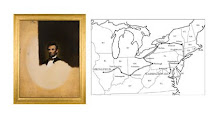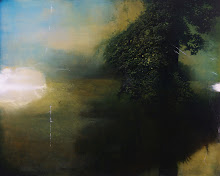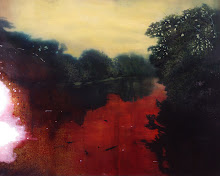Monday, July 12, 2010
Tolono-Danville, Illinois, 75miles
Leaving Monticello this morning, we encountered another beautiful day. This time there was not a cloud in the sky. That means it is going to be hot in farm country. Riding by 7am almost felt late, and it is for the people who work the land. The sun is already high in the sky and distances have to be traveled. The roads only marked by signs that say 800 East and 1250 North grided the landscape in one mile by one mile sections. This is the leagacy of the homestead system that Lincoln established over a century ago. In order to populate the 'west', land was parceled up in one mile by one mile sections that had to be worked and improved. After a given amount of time, ownership of the land was transfered to the farmer. My grandfather was the recipient of property in this manner that still remains in our family. When we were cycling along county roads today, every once in a while we would encounter an odd left and then right hand turn. Again, as our land sections are square in Illinois,- the Earth is not. So, in order to map the county by dividing lines along roads, a correction for the curvature of the Earth must occur. So, every once in a while we would make these odd left and right hand turns in the roads. And today we rode them.
The fields truly appeared endless today,- again we saw Oceans of corn and soy beans. We were moving at a pace today that probably equaled a horse and buggy. Cinder roads dotted the farm country. I could watch a tree on the horizon slowly appear larger and larger. Being on a bicycle, like a being on a horse, makes one very aware of where the water is located! It is a very diferent way to think inside of the landscape. I can't help but think that this space had a profound impact on Lincoln. There is a tremendous sense of space and sky and plenty of time to think. His prose seems to have pauses in the wording that are rather unique and it is my theory that central Illinois must have had a part in this.
We traveled through Tolono were Lincoln bid farewell to the people of Illinois on his way to Washington. We ended up cris crossing the rail road lines all day that moved east towards Danville and Indiana. Lincoln briefly stopped in Danville at a depot in the old part of town that still has an industrial quality that reminded me of the nineteenth century. Traveling through the heat and dust of the farmland and hearing the schreeching steel of the railroad locomotives brought me closer to the idea of what it must have been like for Lincoln to traverse this space. He was from this part of the country and it gives one a perspective that only one who has traveled it can understand. Thomas Schwartz, the Illinois State Historian has told me that filmakers wanting to do Lincoln 'pieces' only want to talk to him on the phone because they are too busy to see the actual space. Something is terribly missing from these 'pieces' about Lincoln if the Illinois landscape is left out.
The fields truly appeared endless today,- again we saw Oceans of corn and soy beans. We were moving at a pace today that probably equaled a horse and buggy. Cinder roads dotted the farm country. I could watch a tree on the horizon slowly appear larger and larger. Being on a bicycle, like a being on a horse, makes one very aware of where the water is located! It is a very diferent way to think inside of the landscape. I can't help but think that this space had a profound impact on Lincoln. There is a tremendous sense of space and sky and plenty of time to think. His prose seems to have pauses in the wording that are rather unique and it is my theory that central Illinois must have had a part in this.
We traveled through Tolono were Lincoln bid farewell to the people of Illinois on his way to Washington. We ended up cris crossing the rail road lines all day that moved east towards Danville and Indiana. Lincoln briefly stopped in Danville at a depot in the old part of town that still has an industrial quality that reminded me of the nineteenth century. Traveling through the heat and dust of the farmland and hearing the schreeching steel of the railroad locomotives brought me closer to the idea of what it must have been like for Lincoln to traverse this space. He was from this part of the country and it gives one a perspective that only one who has traveled it can understand. Thomas Schwartz, the Illinois State Historian has told me that filmakers wanting to do Lincoln 'pieces' only want to talk to him on the phone because they are too busy to see the actual space. Something is terribly missing from these 'pieces' about Lincoln if the Illinois landscape is left out.
Subscribe to:
Post Comments (Atom)






No comments:
Post a Comment